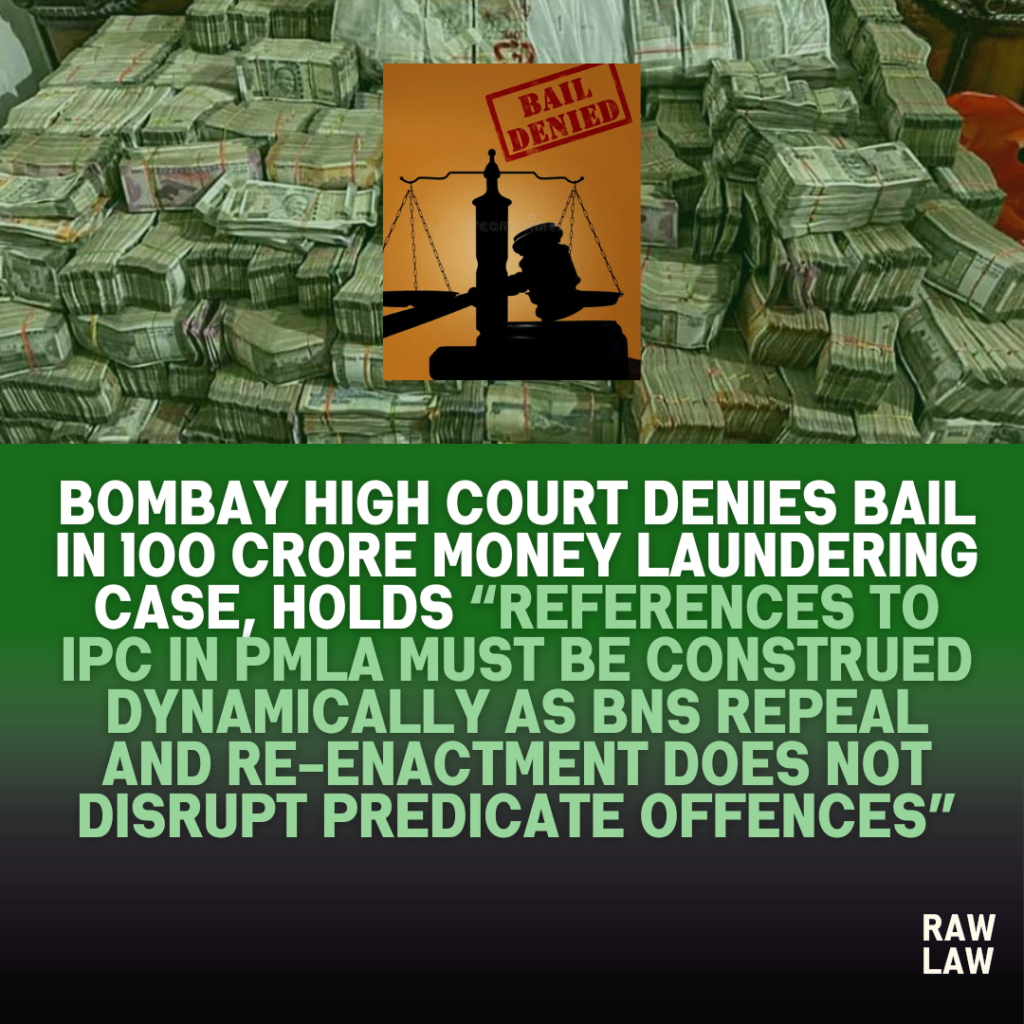Court’s Decision
The Bombay High Court dismissed the bail application under Section 45 of PMLA and Section 483 of BNSS, holding that the offences alleged under the Bharatiya Nyaya Sanhita (BNS), 2023, correspond to IPC offences under the PMLA Schedule and remain valid predicate offences under the Prevention of Money Laundering Act (PMLA), ensuring the continued applicability of PMLA despite the repeal of IPC. The Court held the applicant’s contention that PMLA proceedings cannot continue due to the non-amendment of the Schedule post-IPC repeal as unsustainable.
Facts
The applicant was arrested by the Enforcement Directorate on 20 November 2024 in a money laundering probe involving over Rs. 100 crore deposited in 14 newly opened accounts at Nashik Merchant Cooperative Bank, allegedly layered to conceal illicit origin. The predicate offences were initially registered under IPC, which was repealed on 1 July 2024 and replaced by BNS, and subsequently FIRs were re-registered under BNS Sections 318(4), 338, and 340(2). The applicant’s earlier bail was rejected by the Special Court (PMLA), leading to this application.
Issues
Whether BNS offences can be treated as valid predicate offences under PMLA despite the repeal of IPC.
Whether the PMLA Schedule requires express legislative amendment to replace IPC references with BNS provisions.
Whether the applicant is entitled to bail based on the alleged legal vacuum created by the IPC repeal.
Petitioner’s Arguments
The petitioner argued that:
- PMLA proceedings cannot continue as the PMLA Schedule only lists IPC offences, and post-IPC repeal, BNS offences do not automatically qualify as predicate offences.
- Parliament has not amended the PMLA Schedule to substitute BNS for IPC, hence, prosecutions under PMLA for BNS offences are ultra vires.
- The principle of legislation by incorporation means references to IPC in the Schedule are fixed and cannot automatically accommodate BNS provisions.
- Cited Mahindra & Mahindra Ltd. v. Union of India (1979) and Vijay Madanlal Choudhary (2022) to argue that the PMLA cannot expand the definition of predicate offences without legislative amendment.
Respondent’s Arguments
The Enforcement Directorate argued that:
- The repeal and re-enactment of IPC as BNS attracts Section 8(1) of the General Clauses Act, 1897, which mandates that references to repealed enactments should be construed as references to re-enacted provisions unless a different intention appears.
- BNS substantially retains IPC provisions in substance, ensuring continuity of predicate offences under PMLA.
- Allowing the applicant’s interpretation would create a dangerous legal vacuum allowing money launderers to evade liability during the transition period.
- The doctrine of updating construction requires laws like PMLA to be read in light of current enactments to uphold legislative intent and prevent absurdities.
Analysis of the Law
The Court examined:
- Section 2(1)(u), 2(1)(y), and the Schedule to PMLA, which link money laundering prosecutions to scheduled predicate offences.
- Section 8(1) of the General Clauses Act, mandating substitution of repealed references with re-enacted provisions.
- The distinction between legislation by incorporation (static reference) and legislation by reference (dynamic reference).
- The purpose of PMLA as a continuous anti-money laundering statute requiring effective enforcement without legislative voids.
Precedent Analysis
Relied on:
- Mahindra & Mahindra Ltd. v. Union of India (1979) for distinguishing legislation by incorporation and reference.
- K.P. Varghese v. ITO (1981) for purposive interpretation to avoid absurd results.
- Vijay Madanlal Choudhary (2022) for the principle that predicate offences are integral to PMLA enforcement.
The Court clarified that PMLA references to IPC are legislation by reference, making them dynamic and subject to updating upon repeal and re-enactment.
Court’s Reasoning
The Court held:
- PMLA’s Schedule references IPC offences by section numbers but does not incorporate the text, making it legislation by reference.
- The BNS is a repeal and re-enactment of IPC, preserving the substance of offences while renumbering sections.
- Section 8(1) of the General Clauses Act applies automatically, substituting IPC references in PMLA with corresponding BNS provisions.
- A rigid application of legislation by incorporation would create an absurd scenario, defeating PMLA’s objectives by making money laundering prosecutions impossible during the transition.
- The government notification dated 16 July 2024 clarifying the substitution, though not having legislative authority, aligns with the correct interpretation under Section 8(1).
The Court stated: “The references to IPC offences in the Schedule to the PMLA must now be read as references to the corresponding offences under the Bharatiya Nyaya Sanhita, 2023, to maintain legal continuity and prevent absurd results.”
Conclusion
The High Court:
Dismissed the bail application, holding that BNS offences corresponding to IPC offences continue as valid predicate offences under PMLA by operation of Section 8(1) of the General Clauses Act.
Confirmed that PMLA prosecutions remain valid despite the IPC repeal.
Directed the continuation of the trial under PMLA for the applicant’s alleged laundering of Rs. 100 crore.
Implications
This judgment:
- Ensures PMLA remains effective post-IPC repeal, preventing loopholes for launderers.
- Establishes BNS offences as valid predicate offences under PMLA through dynamic reference.
- Reinforces legislative intent, statutory continuity, and purposive interpretation for robust anti-money laundering enforcement.
Short Notes on Referred Cases
Mahindra & Mahindra Ltd. v. Union of India (1979): Clarified the distinction between incorporation and reference; applied to interpret dynamic reference in PMLA.
K.P. Varghese v. ITO (1981): Supported purposive interpretation to avoid absurd outcomes in statutory construction.
Vijay Madanlal Choudhary (2022): Affirmed the centrality of predicate offences for PMLA enforcement.
FAQs
1. Does the repeal of IPC affect PMLA prosecutions?
No, references to IPC in PMLA are interpreted dynamically, now referring to corresponding BNS provisions.
2. Are BNS offences valid predicate offences under PMLA?
Yes, by applying Section 8(1) of the General Clauses Act, BNS offences corresponding to IPC offences continue as valid predicate offences under PMLA.
3. Can a legal vacuum arise in PMLA due to IPC repeal?
No, dynamic interpretation ensures continuity, preventing any enforcement gaps under PMLA.



